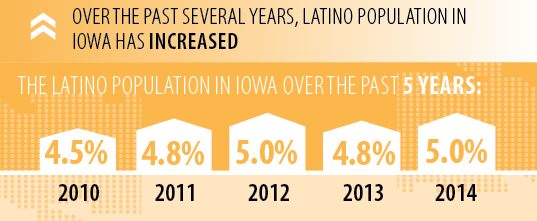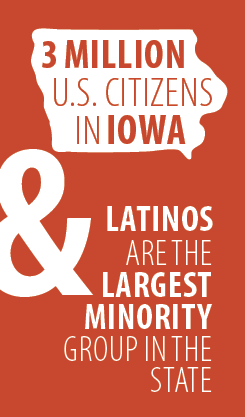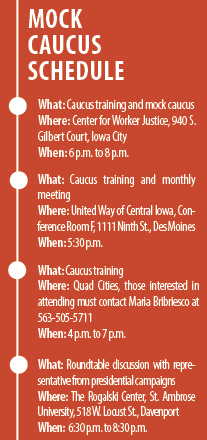Iowa’s largest minority group, Latinos, is hoping to break stereotypes and stigma about Latinos in Iowa by making their way out to the first-in-the-nation caucuses
By Rebecca Morin | [email protected]
Iowa resident Jose Estrada has never caucused before, let alone been registered to vote in the state.
But that all changed Tuesday.
“I’m trying to get familiar with the process myself,” Estrada, who is from Columbus Junction, said about voting and caucusing.

Estrada became a registered voter fewer than two weeks before the Iowa caucuses after taking part in initiative by the League of United Latin American Citizens of Iowa in partnership with the national chapter to get Latinos to caucus on Feb. 1.
With 12 days left until the caucuses, there has been a final push by the group to get Latinos to register to vote and to attend the caucuses.
The campaign, which began in November 2015, has reached out to nearly 43,000 registered Latino voters in Iowa through mock caucuses, canvassing, and in-person connections. The league’s goal, however, is to try to get 10,000 to 20,000 Latinos out on caucus night.
The efforts came about after only 1,000 Latinos caucused in 2012 — fewer than 3 percent of eligible voters that election cycle. There was about 52,000 eligible voters in the 2012 election, according to Pew Research Center, which was still less than half the population of Latinos in Iowa, which is about 151,000.

Estrada, 44, first participated in a mock caucus in his town; he did not wish to disclose which party he would caucus for. He said he has yet to decide on a candidate he will support.
He said there were around 15 people at his mock caucus, but he sees more people showing interest.
“Just the fact that people are really upset with what they’re seeing on TV, now they’re starting to wonder if they need to come out and show their interest,” Estrada said.
The Latino league has focused its efforts on counties and cities with larger Latino populations, such as Columbus Junction, where Latinos make up almost half of the town’s population.
Maria Bribriesco, the deputy state director of the league, said she believes it’s more significant than ever to come out and show that Latinos are a significant part of the population, not just in Iowa but across the nation.
She said Latinos are often painted with a broad brush, such as being “lazy” or “dumb,” especially by Republican presidential front-runner Donald Trump.
“When Mexico sends its people, they’re not sending their best,” Trump said when he first announced his candidacy. “They’re not sending you. They’re sending people that have lots of problems, and they bring problems with us.”
Bribriesco, who is from Davenport, said Latinos are now organizing so they can be seen and so candidates like Trump will not get elected.
“We are a substantial number of citizens in this country; we want our voices heard,” she said. “I think we’ve participated in the past, but I think we were overlooked.”
The only time Latinos come up in the conversation, Bribriesco said, is when immigration is brought up.
But that is not always the No. 1 issue with the Latino population.

According to the 2012 National Survey of Latinos, 55 percent of registered Latino voters said education was their top issue, followed by jobs and economy at 54 percent. Immigration was the least important, at 34 percent.
Immigration, however, is the center of the first-ever Define American Film Festival, which will take place in Des Moines this coming weekend. It was created by Jose Antonio Vargas, a Pulitzer Prize-winning journalist and undocumented immigrant.
The effort is to “humanize a very partisan and political issue through a slate of films that showcase that,” Vargas said in a statement.
Ryan Eller, the executive director of Define American, said Iowa was the ideal location for the festival because it’s a proving ground for the next president.
“Exploring this immensely relevant cultural and media moment through stories will allow us to bring a much-needed humanity and honesty to what has been an unnecessarily volatile debate,” he said.
Though Bribriesco said league officials will not know the turnout of their efforts until caucus night, she said they are “beating the bushes” now.
“We are citizens; we have been here a long time, some of us longer than others,” she said. “We need everybody to know that we are here. We deserve and expect a place at the table.”



